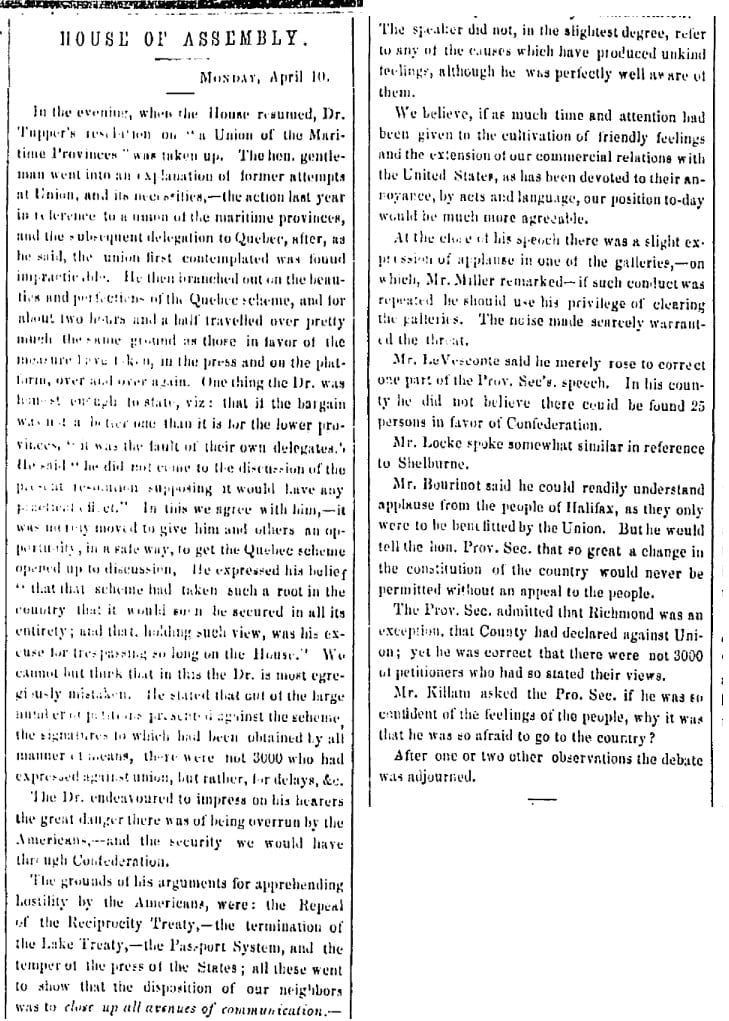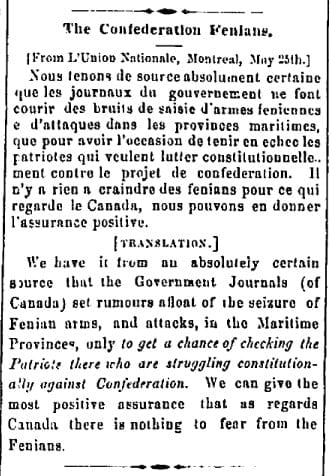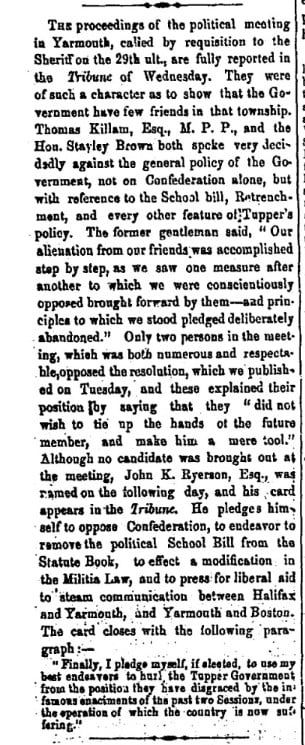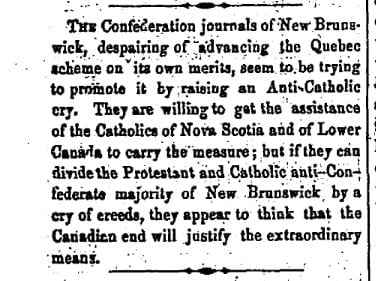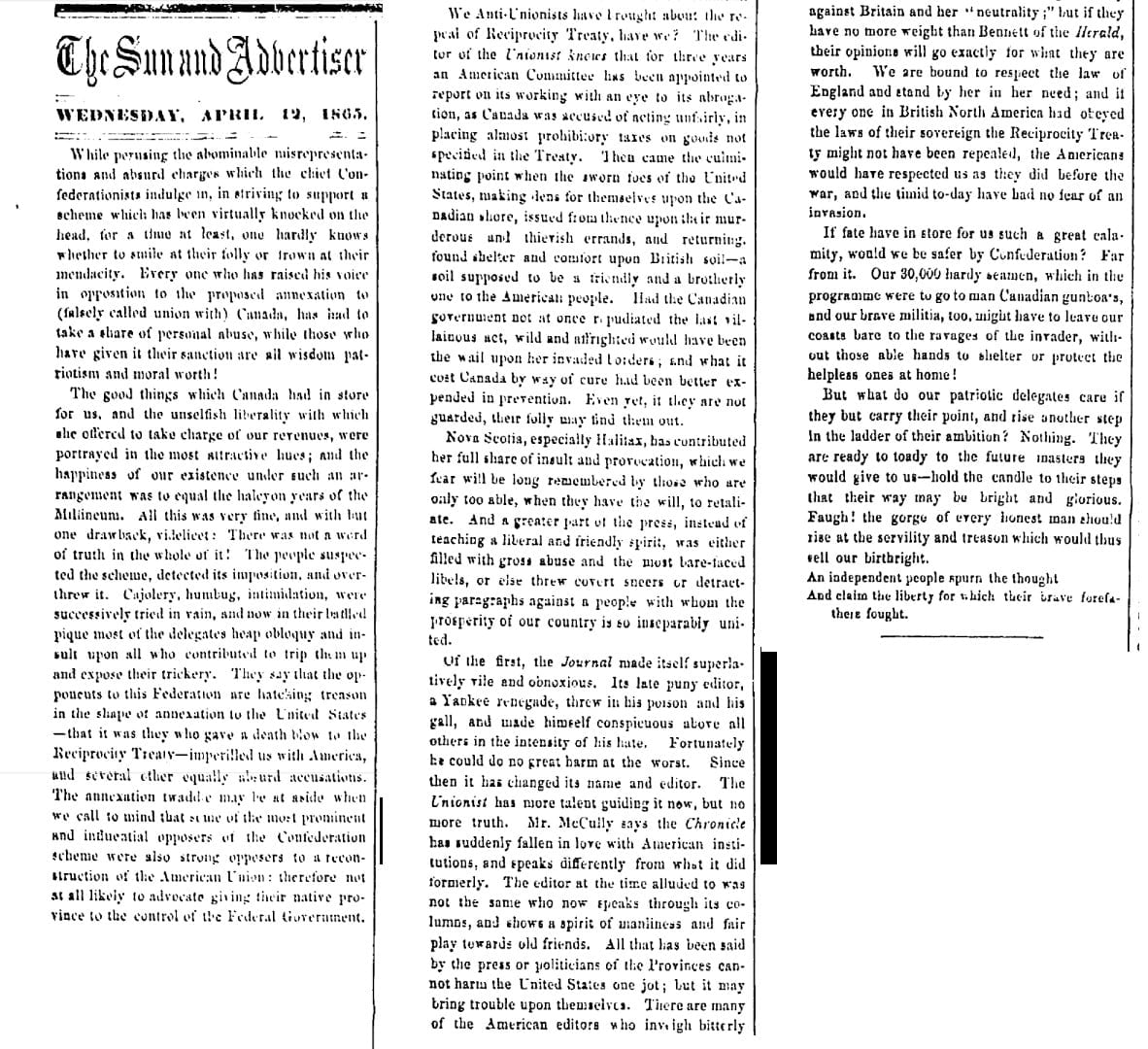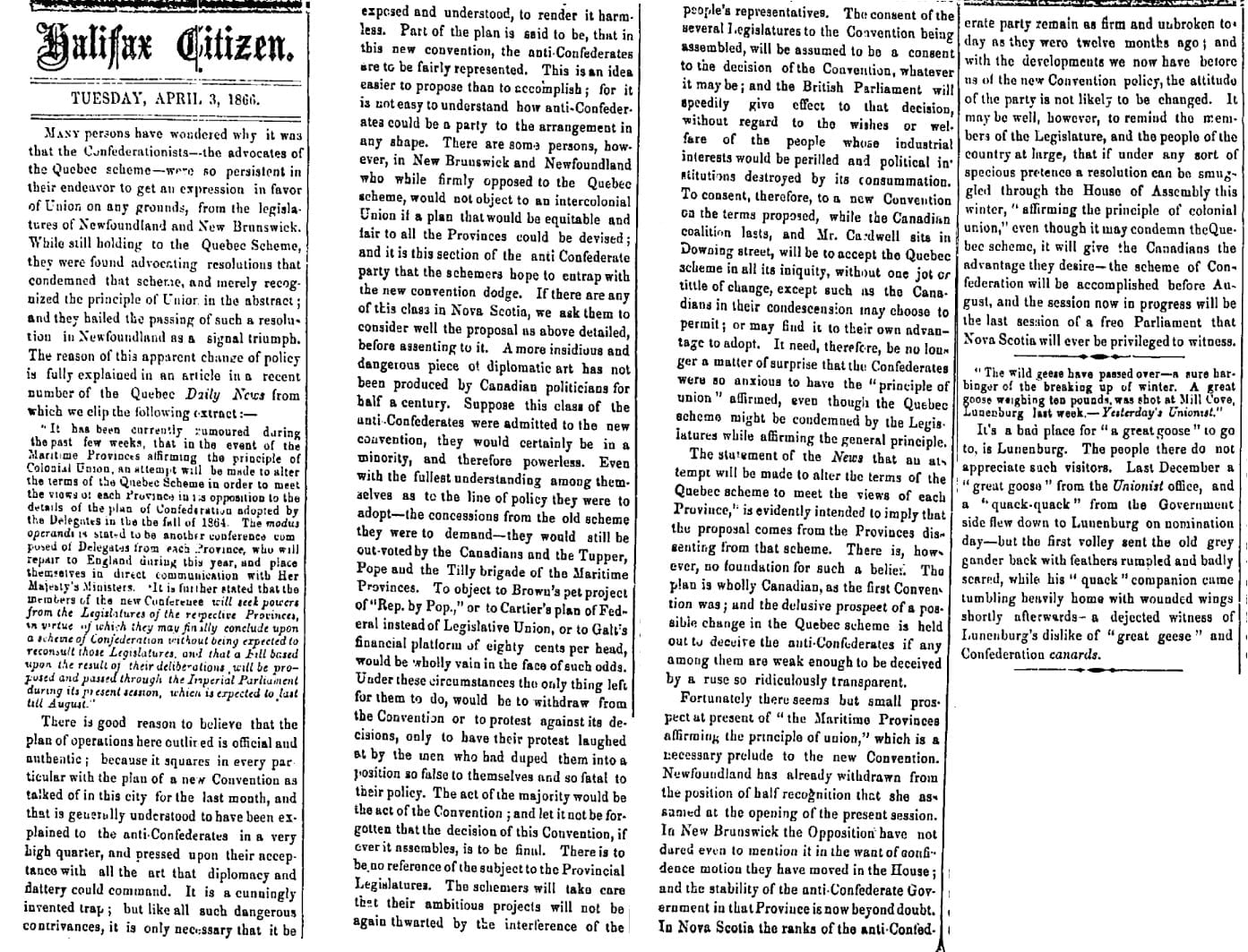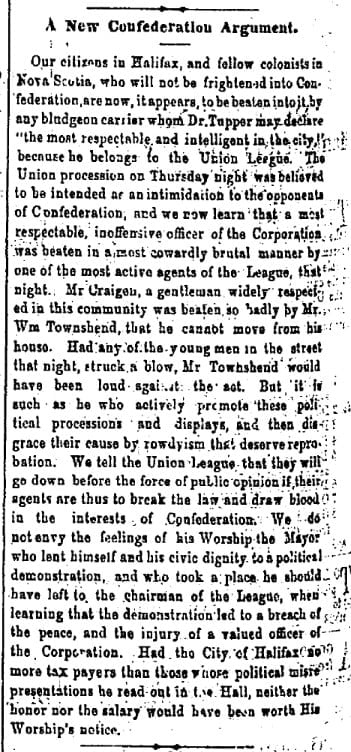
Many persons have wondered why it was that the Confederationists — the Advocates of the Quebec scheme — were so persistent in their endeavour to get an expression in favor of Union on any grounds, from the legislators of Newfoundland and New Brunswick. While still holding to the Quebec scheme, they were found advocating resolutions that condemned to that scheme, and merely recognized the principle of Union in the abstract; and they hailed the passing of such a resolution in Newfoundland as a signal triumph. The reason of this apparent change of policy is fully explained in an article in a recent number of the Quebec daily news from which we clip the following extract:—
It has been currently rumoured during the past few weeks, that in the event of the Maritime Provinces affirming the principle of colonial Union, an attempt will be made to alter the terms of the Quebec scheme in order to meet the views of each province and its opposition to the details of the plan of Confederation adopted by the Delegates in the fall of 1864. The modus operandi is stated to be another conference composed of Delegates from each Province, who will repair to England during this year, and place themselves in direct communication with Her Majesty’s ministers. It is further stated that the members of the new Conference will seek powers from the Legislatures of the respective Provinces, in virtue of which they may finally conclude upon a scheme of Confederation without being expected to reconsult those Legislatures, and that a bill based upon the result of their deliberations will be proposed and passed through the Imperial Parliament during its present session, which is expected to last till August.
There is good reason to believe that the plan of operations here outlined is official and authentic; because it squares and every particular with the plan of a new Convention as talked of in this city for the last month, and that is generally understood to have been explained to the Anti-Confederates in a very high quarter, and pressed upon their acceptance with all the art that diplomacy and flattery could command. It is cunningly invented trap; but like all such dangerous contrivances, it is only necessary that it be exposed and understood, to render it harmless. Part of the plan is said to be, that in this new convention, the anti-Confederates are to be fairly represented. This is an idea easier to propose then to accomplish; for it is not easy to understand how Anti-Confederates could be a party to the arrangement in any shape. There are some persons, however, in New Brunswick and Newfoundland who while firmly opposed to the Quebec scheme, would not object to an intercolonial Union if a plan that would be Equitable and fair to all Provinces could be devised; and it is this section of the anti-Confederate party that the schemers hope to entrap with the new convention dodge. If there are any of this class in Nova Scotia, we ask them to consider well the the proposal as above detailed, before assenting to it. A more Insidious and dangerous piece diplomatic art has not been produced by Canadian politicians for half a century. Suppose this class of the anti-Confederates were admitted to the new convention, they would certainly be in a minority, and therefore powerless. Even with the fullest understanding amongst themselves as to the line of policy they were to adopt — the concessions from the old scheme they were to demand —they would still be outvoted by the Canadians and the Tupper, Pope and the Tilly brigade of the Maritime Provinces. To object to Brown’s pet project of “Rep. by pop.,” or to Cartier’s plan of Federal instead of Legislative Union, or to Galt’s financial platform of eighty cents per head, would be wholly vain in the face of such odds. Under these circumstances the only thing left for them to do, would be to withdraw from the convention or to protest against his decisions, only to have their protest laughed at by the men who had duped them into a position so false to themselves and so fatal to their policy. The act of the majority would be the act of the Convention; and let it not be forgotten that the decision of this Convention, if ever it assembles, is to be final. There is to be no reference of the subject to the Provincial Legislatures. The schemers will take care that their ambitious project will not again be thwarted by the interference of the people’s representatives. The consent of the several Legislatures to the Convention being assembled, will be assumed to be a consent to the decision of the Convention, whatever it may be; and the British Parliament will speedily give effect to that decision, without regard to the wishes or welfare of the people whose industrial interests would be perilled and political institutions destroyed by its consummation. To consent, therefore, to a new Convention on the terms proposed, while the Canadian Coalition lasts, and Mr. Cardwell sits in Downing Street, will be to accept the Quebec scheme in all its iniquity, without one jot or tittle of change, except such as the Canadians in their condescension may choose to permit; or may find it to their own advantage to adopt. It need, therefore, be no longer a matter of surprise that the Confederates were so anxious to have “the principle of Union” affirmed, even though the Quebec scheme might be condemned by the Legislatures while affirming the general principle.
The statement of the news an attempt will be made to alter the terms at the Quebec scheme to meet the views of each province, is evidently intended to imply that the proposal comes from the province’s dissenting from that scheme. There is, however, no foundation for such a belief. The plan is wholly Canadian, as the first convention was; and the delusive prospect of a possible change in the Quebec scheme is held out to deceive the Anti-Confederates if any among them are weak enough to be deceived by a ruse so ridiculously transparent.
Fortunately there seems to be small prospect at present of “the Maritime Provinces affirming the principle of Union”, which is a necessary Prelude to the new Convention. Newfoundland has already withdrawn from the position of half recognition that she assumed at the opening of the present session. In New Brunswick the opposition have not dared even to mention it in the want of confidence motion they have moved in the House; and the stability of the anti-Confederate Government in that Province is now beyond doubt. In Nova Scotia the ranks of the Anti-Confederate party remain as firm and unbroken today as they were twelve months ago; and with the developments we now have before us of the new Convention policy, the attitude of the party is not likely to be changed. It may well, however, to remind the members of the legislature, and the people of the country at large, that if under any sort of specious pretense a resolution can be smuggled through the House of Assembly this winter, “affirming the principle of colonial union,” even though it may condemn the Quebec scheme, it will give the Canadians the advantage they desire — the scheme of Confederation will be accomplished before August, and the session now in progress will be the last session of a free Parliament that Nova Scotia will ever be privileged to witness.
“The wild geese have passed over — a sure harbinger of the breaking up of winter. A great goose weighing ten pounds was shot at Mill Cove, Lunenburg, last week —yesterday’s Unionist.
It’s a bad place for “a great goose” to go to is Lunenburg. The people there do not appreciate such visitors. Last December a “great goose” from the Unionist office and a “quack-quack” from the Government side flew down to Lunenburg on nomination day — but the first volley sent the old grey gander back with feathers rumpled and badly scared, while his “quack” companion came tumbling heavily home with wounded wings shortly afterwards — a dejected witness of Lunenburg’s dislike of “great geese” and Confederation canards.
Halifax Citizen, April 3, 1866. Page 1 Column 1-2. https://news.google.com/newspapers?nid=D90uR9ClOh8C&dat=18660403&printsec=frontpage&hl=en



